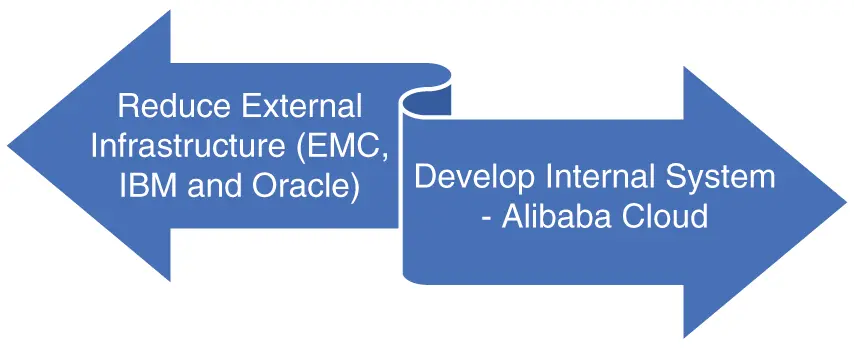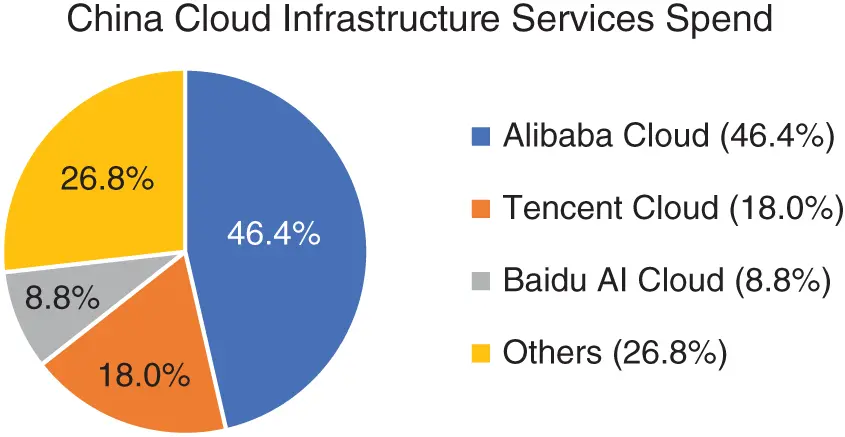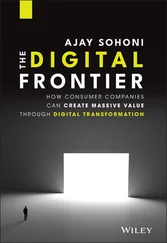Just like AI and blockchain, China's Big Data and cloud computing market is growing at a rapid clip. In recent years, data centers—secure facilities that house large-capacity servers and data storage systems—have been built at a breathtaking pace to catch up with the explosive demand of data services. The latest from the Chinese government is to build “industrial big data” centers nationwide, such that massive amounts of “industrial big data”—mostly manufacturing and production data—can be utilized to advance the capabilities of traditional industries.
These data facilities are used by enterprises to remotely store large amounts of data, manage their business applications, and host cloud computing operations. Thanks to the cloud units of internet companies like Alibaba and Tencent, China has emerged as a global leader in data-intensive computing. Alibaba Cloud, for example, was formed to provide cloud services to Alibaba's business network, and increasingly external enterprise customers. As the following two sections show, the digital platforms not only help industrial companies' digital transformation, but also provide an important infrastructure for tech startups' innovation. In short, the Chinese internet companies that emerged from the mobile internet boom are becoming the technology infrastructure of China's digital economy.
Digital Transformation in the Cloud
Regarding China's new infrastructure and enterprises' digital transformation, Alibaba Group and its Alibaba Cloud are a perfect example. During the mobile revolution, all Chinese companies started to digitalize their business data and internal systems, and they are increasingly migrating operations and data to the cloud infrastructure (until recently, most of them still rely on local computing in their own data centers). Though Alibaba is mostly known for its e-commerce empire and Singles Day, it has become the first company in the world to run all core business systems on its own public cloud platform. Moreover, its fast-growing cloud computing business further supports other Chinese businesses' cloud-migration journey.
For background, Cloud technology (also known as “cloud computing”) means that servers, data storage, databases, networking, software, and analytics are hosted on the internet and stored on large, privately owned data centers. The cloud provider enables end users to “rent” and remotely access IT resources from cloud providers on a pay-per-use basis, which provides an efficient alternative to the local hosting and operation of IT resources. Businesses subscribe to cloud services and pay either a monthly or annual fee, just like buying electricity from a power grid. This fee is determined by the amount of data and number of users a business requires – making it easier for a company to scale its operations up and down. Overall, cloud computing provides both improved system scalability and cost savings over traditional IT infrastructure.

Figure 1.6 Alibaba's IT infrastructure goes internal
As Alibaba's e-commerce businesses have enjoyed explosive growth in recent years, an upgrade of its own internal systems was much needed. Rather than continuing to procure expensive equipment and services from Oracle, IBM, and EMC, Alibaba began replacing its existing IT infrastructure with in-house systems and migration to the cloud. Consequently, Alibaba Cloud was formed to provide cloud services to Alibaba's business network. Today, Alibaba Cloud is also Alibaba Group's cloud computing business for external corporate customers, offering a complete suite of services such as database, storage, network virtualization services, Big Data analytics, elastic computing, large scale computing, machine learning, and IoT services.
Alibaba Cloud has played a major role in educating the domestic market about the benefits of cloud computing, and it maintains its leadership position by developing solutions that enable the digital transformation of businesses across industries. During the last quarter of 2019, it reached two important milestones. First, the cloud computing business for the first time generated over 10 billion RMB of revenue (about US$1.5 billion) in a single quarter. Second, ahead of the 11.11 global Shopping Festival in 2019 (see the details in Chapter 2), Alibaba Cloud enabled the migration of the core systems of Alibaba e-commerce businesses onto the public cloud. This internal migration is a major milestone that not only generates greater operating efficiencies for Alibaba, but also encourages more companies to adopt its public cloud infrastructure.
According to Alibaba, the performance, reliability, and agility of the core ecommerce platform increased drastically after completely moving onto its public cloud. (“Alibaba is like a high-speed jet that is capable of upgrading its engine during the course of flight”, one Alibaba executive said.) The next step for the company is to share Alibaba experience with its customers. As such, the investment and adoption of the cloud in China are growing rapidly. According to Canalys' statistics in March 2020, Alibaba Group is China's largest provider of public cloud services, taking almost half of the market. (See Figure 1.7. Tencent and Baidu, two major internet companies, are also sizable cloud service providers.) According to Gartner's April 2020 report, Alibaba Group is the world's third largest and Asia Pacific's largest Infrastructure as a service provider by revenue in 2019.

Figure 1.7 Alibaba Cloud leads the Chinese market
Data Source: Canalys, March 2020.
As the Alibaba Cloud case illustrates, Chinese internet companies have turned themselves into tech companies, and they subsequently help companies from all sectors of the economy to digitally transform. Across just about every industry sector, Chinese companies are investing heavily in research and development of the latest digital technology. The consensus is that digital revolution is more than simply advancing e-commerce through mobile platforms. The more profound value creation is to find incremental consumption demand and new business models, where traditional industries use new set of digital tools to run key aspects of their business.
In other words, digital transformation is more about “digital thinking” than “internet adding”. The companies will become “smarter” by fusing institutional human knowledge with machine learning, and their increased efficiencies, faster decision making, and cost savings will all lead to better customer experiences.
For example, the traditional retail industry has been completely remodeled, thanks to the largest mobile e-retailing market in the world. Retailers are forced to move away from the out-of-date perception that e-commerce is merely another sales channel for their products, as it is critical for customers to get the same products, services, and shopping experience in every channel where they choose to make purchases. To meet the demand of tech-savvy customers, retailers must provide a “seamless omni-channel shopping experience” by integrating their online and offline channels, instead of having separate systems to sell products online and offline. Hence, the trend of “new retail”, where the boundaries between online and offline are disappearing.
During the 2020 coronavirus pandemic, new digital tools have proven to be a lifeline for China's small retailers as the pandemic disrupts business models and consumer behavior. Small merchants—including many with little or no previous online presence—have flocked to live-streaming to boost sales at a time when consumer habits are changing faster than ever. The video streaming has the advantage of enabling live interaction—consumers can send questions and comments that appear on the screen in real time, and sellers can explain and showcase their products in a personal way. In this context, new retail is more about generating demand by exciting people and creating an experience. (The detailed “new retail” cases are discussed in related chapters in Part Two.)
Читать дальше














